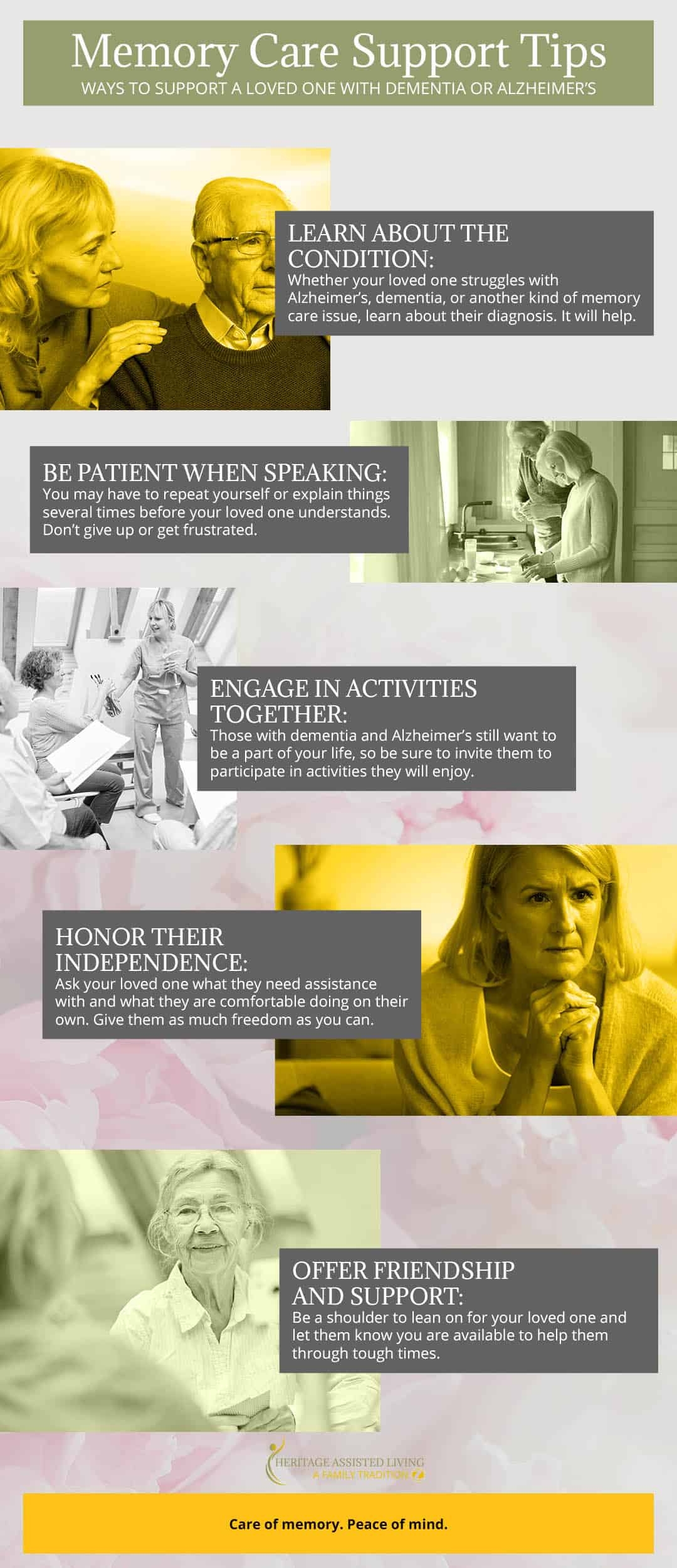RELIEF FROM WANDERING
In the early stages of cognitive decline, people with dementia or Alzheimer’s might still seem to be their usual selves. In time, however, persons suffering from these kinds of conditions can develop a tendency to walk off unexpectedly. It’s not unusual for a memory care resident to have previous experiences that correspond with this.
At our memory care unit, we understand that if they are not properly and safely looked after, individuals can wander away without knowing what has happened. This exposes the individual with dementia or Alzheimer’s disease to many risks including falls, bone fractures, inclement weather conditions, hypothermia, heat stroke and a general increase in overall emotional distress.
TRAINED PERSONNEL
During the early stages of onset, many people are capable of handling some signs and symptoms of dementia from their loved ones, but it's amazing how quickly you — and the disease — can get far out of your depth.
The staff at our professional facility here at Heritage Assisted Living are specifically trained to care for people with dementia and certified to operate our memory care unit. We rotate our staff less frequently so that our clients have the opportunity to see familiar faces and build meaningful connections.
We are also trained to ensure the safety of all our residents. Supervision is provided 24 hours per day, 7 days a week, and all monitoring staff are professionally trained to accommodate the specific needs and requirements of those coping with dementia. Whether your loved one has a tendency to wander or needs assistance in acquiring proper and consistent nutrition, we have the resources, expertise, and compassion to keep them as healthy and happy as possible.
ENJOYABLE PROGRAMMING
Just because an individual has a condition like dementia or a disease such as Alzheimer's doesn't mean that he or she should in any way be precluded from fun and joy. This is precisely why we structure each and every day in our memory care community to be as enjoyable, stimulating, and welcoming as possible.
In social settings, we encourage and facilitate conversation, provide guidance on ways of obtaining personal growth, and overall stressing the fundamental practices that allow for simple enjoyment of life. We design our programming in such a way so that every resident has the ensured opportunity to engage with peers and personnel in a safe, supportive, and hopeful environment. Thriving is the inevitable result in most all of our residents.
PEACE OF MIND
One of the most painful challenges anyone faces as they grow older is the struggle to maintain quality of life. When it comes to conditions of progressive neurocognitive decline, eventually, it is impossible to maintain this quality by oneself. Many times, it is too difficult even with the investment, love, and time of family members.
At Heritage Assisted Living, we know that you want the very best for your loved one. We are also cognizant that you need a certain peace of mind, knowing that your loved one will live in a place where he or she can thrive, enjoy life, stay safe, and socialize among friends and caretakers. That is why we pour all we have into memory care efforts every day, working diligently to make our community the very best assisted living organization in New Jersey for persons with dementia or Alzheimer's.
▷ INDIVIDUALIZED CARE PLANNING
▷ STIMULATING AND EXCITING ACTIVITIES
▷ SECURE, SAFE ENVIRONMENT
▷ DIGNITY
▷ FELLOWSHIP
▷ COMFORTABLE, HOMELIKE SURROUNDINGS
▷ MEDICAL MONITORING AND SUPERVISION
▷ RN INVOLVEMENT AND ACCESS ON A 24-HOUR BASIS
▷ MEDICATION ADMINISTRATION
Contact us to learn more about our unique senior apartments today!
HOW MEMORY CARE DIFFERS FROM ASSISTED LIVING
Memory care assisted living is different than other types of senior care like nursing homes or less intensive assisted living residence. Because those with memory impairment caused by dementia or Alzheimer’s disease present cases with additional challenges, it takes a highly specialized team to help correctly and adequately.
At Heritage Assisted Living, our memory care facility is a special place for seniors with cognitive decline and impairment. Read on here to learn how our designated memory care unit differs from our other senior care or assisted living programs. We are located in Hammonton, and we often serve residents from the Shamong, Winslow, Vineland, Buena Vista Township, and Berlin areas of New Jersey.

MOBILITY ISSUES
It’s not unusual for those who suffer from neurocognitive impairment to also struggle with mobility issues. Whether minor or major in its destabilizing effect, mobility issues can present many challenges.
For instance, those who suffer from Alzheimer’s disease or other manifestations of dementia often forget what a healthy individual might consider to be simple things. The person may become confused, frustrated, or angry when their body does not respond the way it should or the way it used to. Once easily executed motions made without much thought may now take a great deal of mental effort to achieve.
If an individual with dementia pushes themselves too far or doesn’t understand their own limitations, their actions can lead to falls and serious injury. If they are already recovering from an injury such as a joint replacement, a broken or fractured bone, or a dislocation, these factors can all too easily aggravate the injury, leading to painful and sometimes fatal complications.
Specially trained staff know and understand on a fundamental level the challenges these residents face. In our memory, dementia, and Alzheimer’s care units, all staff are more attentive and receptive to the physical needs of those with mobility needs, from mild to severe. Our amenities and accommodations for mobility issues include assistive devices, specially trained nursing assistants, certified physical therapists, and an entire community of compassionate residents willing to help. If anything goes wrong, there’s no need to fret; our memory care team will always have the expertise to know what to do and how to resolve the issue.

PAIN CONTROL AND ANXIETY
In those affected by age-related memory impairment, pain can manifest in a plethora of different ways. More often than not, those who suffer from dementia struggle with emotional identification. That is, they are not aware of what they are feeling or how to express it in understandable terms.
In addition to emotional distress, pain management can be especially difficult when it arises. Pain may manifest in various forms, such as anger or combativeness; this is due to the resident’s sense of helplessness in their situation. It is difficult to imagine how terrifying and saddening this state feels to be in. When one is not able to identify and express their own needs, as much as they may wish to, anxiety and unease are not uncommon reactions.
This intense distress, coupled with the fact that some pain management methods and medications alter the mental state of healthy individuals, can further exacerbate cognitive impairment and confusion.
Thankfully, the nursing staff at our memory care unit are well trained and highly experienced with identifying pain symptoms in patients with dementia and Alzheimer’s disease. We treat pain — whether emotional, physical, or a combination of both — with minimally disruptive methods that will not sedate residents or cause them any more emotional distress.

ACTIVITIES OF DAILY LIVING
In our general assisted living environment, most residents require little assistance with activities of daily living (ADLs). While certain individuals may require some assistance in setting up meals, they are generally able to feed themselves without much trouble.
Conversely, when working with minds affected by dementia, it is crucial for staff to remain acutely aware of meal times. Additionally, they must record and monitor how much nourishment a resident is taking in. The basic physiological processes of the body, including hunger and fullness cues, are things that the memory care resident is not always aware of.
For some residents receiving assistance with ADLs, the act of getting food into the mouth may be completely or largely intact. However, depending on the severity of the cognitive impairment, remembering to properly chew and safely swallow the food may be compromised. This is where a specially trained staff comes in, to help remind the dementia client of what they have and have not done in regard to personal hygiene, personal care, toileting, and feeding.
Throughout our memory care community, our dedicated nursing assistants and patient care technicians are skilled, trained, and patient. They have the compassion and the experience to help those who cannot help themselves. Whether a resident needs accommodation in finding their room, getting dressed, bathing, brushing their teeth, or simply drinking enough fluids, we maintain a close eye on each individual to ensure their fundamental needs are taken care of.
When your loved one suffers from dementia, Alzheimer’s, or age-related neurocognitive decline, you need someone that you can count on to provide quality care, day in and day out. At Heritage Assisted Living, we are proud to provide that in our world-class memory care facility. Please contact us as soon as you can to schedule a tour, get more information about our program, or just to talk to a professional who understands what you’re enduring.
FREQUENTLY ASKED QUESTIONS
ABOUT MEMORY CARE

